Gateway NV58 (Intel) - OS Benchmarks
Wrapping up our look at OS performance on the NV58, we have our OS boot/shut down, hibernate/resume, and sleep/wake test results. As with the NV52, there was a fair amount of variability between test runs. We took the best result of numerous runs for each OS. Once more, note that Windows XP will have an advantage in the hibernate/resume testing because we are using a 32-bit OS (3GB addressable RAM) instead of a 64-bit OS (4GB addressable RAM). No OS wins - or loses - in every single category, but Windows XP and Win7 are usually near the top and Ubuntu and Vista are near the bottom.
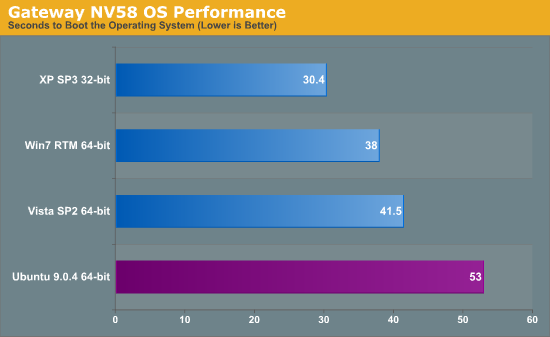
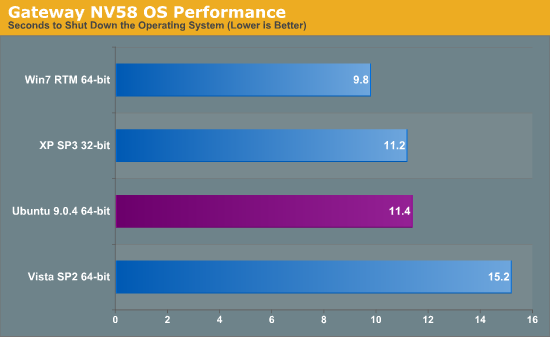
XP loads the fastest once again, this time leading the competition by a larger margin than on the NV52. Windows 7 takes 25% longer to boot, Vista takes 36% longer, and Ubuntu is in last at 74% longer than XP. The GRUB delay is a large portion of the poor showing for Ubuntu, though; it would be very close to the Vista result without the extra ~10 seconds. Shut down times new Windows 7 into the lead, with XP and Ubuntu essentially tied at around 15% longer than Vista bringing up the rear taking 55% longer than Win7.
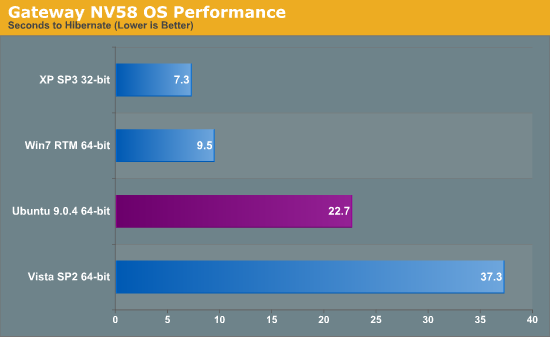
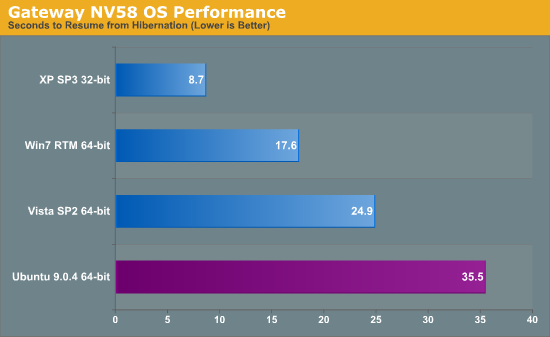
As expected, Windows XP leads in hibernate/resume times since it doesn't have to deal with as large of a hibernation file. Windows 7 trails XP in hibernate times by 30%, correlating very well with the difference in addressable memory. Ubuntu is in third place, requiring over three times as long to hibernate as XP (211% longer). The Vista result is the worst by far, taking 411% longer than XP. There's again the question of whether drivers are somehow at fault, but whatever the cause the NV58 took substantially longer to hibernate on Vista every single time. Resume times don't change the standings much, except Windows XP holds an even larger lead and takes less than half as long as the next closest competitor, Windows 7, which requires 102% more time. Windows Vista doesn't do as poorly in the resume times, though it still trails XP by 186%. Ubuntu is in last place taking just over four times as long to resume as XP, but again the 10 second GRUB penalty is at play.
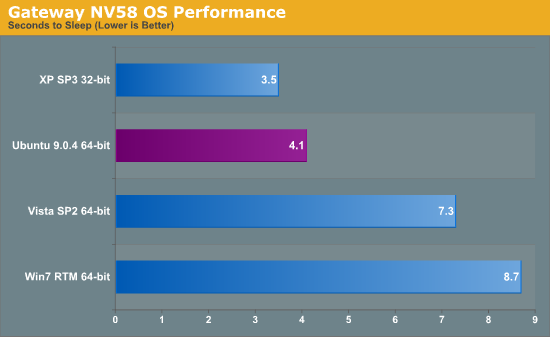
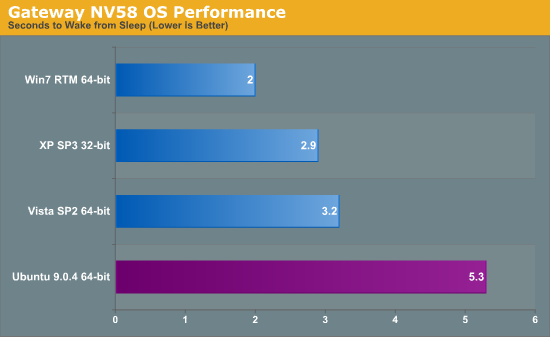
Finally, in sleep times Windows XP again leads, this time followed by Ubuntu which is very close at only 17% longer. Vista takes 109% longer than XP and for once Windows 7 brings up the rear requiring 149% longer than XP to go to sleep. Interestingly, Win7 is the fastest when it comes to waking, requiring just 2 seconds. XP and Vista are 45% and 60% longer, but they're both only around three seconds. Ubuntu is last taking 165% longer than Windows 7, with a result of 5.3 seconds. Since we're dealing with such short times with sleep/wake cycles, the raw percentages and charts aren't nearly as meaningful. As mentioned before, Ubuntu and Win7 tend to be a little more consistent, whereas the best-case results for XP and Vista can be an order of magnitude faster than the worst-case results. If nothing else, Ubuntu is very consistent at going to sleep in around 5-10 seconds; Windows 7 sleep times range from just under 9 seconds up to around 30 seconds, and XP and Vista can take over a minute to go to sleep at times. The difference between 5 seconds and 10 seconds is somewhat annoying, but it's not a huge issue unless you're putting your system to sleep constantly. Occasional delays of over a minute on the other hand can be truly frustrating. For what it's worth, toss in an SSD and the sleep/wake times all appear to be far more consistent (though we didn't conduct in-depth testing on either of these notebooks with SSDs).










106 Comments
View All Comments
Veerappan - Tuesday, September 22, 2009 - link
I'm not sure if it's possible at this point, but if you can, would it be possible to try out a copy of the 9.10 Alphas that are available? They should hopefully fix some of the intel driver regressions.Also, as an FYI/diagnostic, there's a CPU speed applet that is available in Gnome. Right click the top panel, select 'add to panel', and then somewhere there's a cpu speed monitor. That can be used to see if SpeedStep/Cool'n'Quiet are working correctly. You can even take it a step further, and change the permissions of the applet to allow you to change which CPU speed governor is active if you find that the CPU is running at full speed constantly.
lyeoh - Tuesday, September 22, 2009 - link
By the way, you should not use external sites during your test. The fact that you said "perhaps a Flash ad server was temporarily down" means you are doing it wrong.Different flash ads could be very different in CPU usage.
What you should do is snapshot/save the complete pages loaded from the websites you want, put them on a standardized webserver under your control, and then get the browsers to load the pages from that webserver. Disconnect the test network from the internet to prove that the page loads up fine without requiring external connections (css etc). You may need to include a test DNS server that fakes the replies, or stick to using IP addresses to access the test pages e.g. http://10.5.5.1/site1/testpage1.html">http://10.5.5.1/site1/testpage1.html http://10.5.5.1/site2/testpage1.html">http://10.5.5.1/site2/testpage1.html http://10.5.5.1/site3/testpage1.html">http://10.5.5.1/site3/testpage1.html
Once you have standardized on a set of pages, this means you don't have to redo the tests on all computers weeks/months later when you have another laptop to test. You only need to test the new device - since the pages are the same. Don't change the webserver too much either (but given the low loads it's unlikely to affect things much - unless it's really really slow).
JarredWalton - Tuesday, September 22, 2009 - link
Already in progress, after my round two Internet testing still proved too variable. As noted elsewhere, though, I want the content to be as close to realistic as possible. Law of averages says that most of the ads will balance out. It's also possible my home wireless phone knocked out my home WiFi a few times, which would mean several minutes (more?) of non-traffic. Many times I'm not around while letting the battery drain, since that's a bit of a waste of time.I need a new home phone for sure, though. The 2.4GHz model I bought several years back wreaks havoc on my 802.11n network.
strikeback03 - Wednesday, September 23, 2009 - link
You need a home phone at all?JarredWalton - Wednesday, September 23, 2009 - link
Babysitters might need something to call us, yeah. Could leave a cell with them I suppose, but I also use it for business/fax.7Enigma - Wednesday, September 23, 2009 - link
I highly recommend the Uniden DECT6.0 models. The kit I got about 6 months ago to replace crappy old units was ~$110 for 3 units. Additional units (if your manion requires :) can be added easily to the setup for another $30-40. No wireless issues whatsoever. And it's the first phone I've been able to use out to my curb without issues (brick exterior with plaster walls = bad signal). The only gripe I have is there doesn't appear to be a way to change the caller ID name when it comes in. You can program your own numbers in, but when you receive a call it always shows only how caller ID recognizes it.Got mine from the egg.
mschira - Monday, September 21, 2009 - link
on my Atom based laptop. Flash is mostly used for annoying advertising. And it eats CPU, makes the budy slow.Booo to flash...
M.
dnd728 - Tuesday, September 22, 2009 - link
If Adobe merely added a button to freeze all Flash animations or even just freeze all Flash in non-active tabs, then like a hundred power plants could have been scraped…JarredWalton - Tuesday, September 22, 2009 - link
Which is what FlashBlock does. :) Of course, Linux browsers by default don't normally auto-play Flash I don't think. I enabled that with Firefox and then used FlashBlock to stop it, just for an "apples-to-unoptimized-apples" comparison to Vista.bigboxes - Monday, September 21, 2009 - link
Whatever. I use adblock plus and see few ads. Flash, however, is a part of how we view the internet. It's a part of our experience. If you want a text only internet please feel free to step back in the wayback machine to 1988.